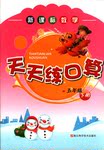题目内容
Having one of those days or weeks — when everything seems to annoy you? Even if you do nothing about it, your bad mood will probably go away after some time. But with a little effort, you can forget it much faster — often within a day or two.
Walk it off
Exercise is the most popular bad-mood buster. A person who’s in a bad mood has low energy and high tension. Taking a fast ten-minute walk, or doing some quick exercises can do wonders towards changing that bad mood.
Tune it out
Listening to your favorite music for a while can also make tension go away quickly, because music starts associations with past positive experiences we’ve had.
Give yourself a pep talk
Stop and listen to what’s on your mind. Bad moods are often started by too many negative thoughts. Write them all down on paper; the pessimistic (悲观的) messages you’ve been giving yourself and then give optimistic answers. ("I still don’t have a job. "vs" I have two interviews next week.")
Reduce your stress
Relaxation techniques are wonderful mood-lifters. These include deep breathing, stretching and visualizing (想象), all of which sound complicated but aren’t. One easy way to visualize: close your eyes and picture a favorite place, such as the beach. Another simple way to against distress is to make a to-do list. One reason for being in a bad mood is feeling you have no options(选择权) By taking control over certain areas, you realize you’re not helpless. You can make changes in your mood and life.
Avoid things that won’t improve your mood
TV may not help much: You need to increase your energy level and stimulate your mind something — that the TV show "Neighbors" won’t do. And before you reach for that piece of cake and coffee, think about how mood and food are linked. Sugar and caffeine contribute to depressed moods. The better choice? Research shows that carbohydrates, such as potatoes and pasta, produce a calming effect in people who have a desire for them.
We learn from the text that it might help rid us of a bad mood ________.
A. to do nothing about it
B. to take a long walk on the beach
C. to do some exercises with light music
D. to talk it to neighbours
Why is it suggested that you close your eyes and picture the beach?
A. It is not complicated to do so.
B. It is an area to be easily controlled.
C. It helps beat a bad mood.
D. It brings us a new technique.
TV may not improve your mood because ________.
A. it sometimes shows what happens around you
B. it keeps you stay unmoved
C. it reminds you of eating and drinking
D. it produces a calming effect
This text most probably appears in ________.
A. a book on physical exercises B. a doctor’s handbook
C. a notice D. a magazine
【小题1】C
【小题2】C
【小题3】B
【小题4】D
解析:
本文介绍了改善不良心情的几种方式。
【小题1】C 细节题。综合Walk it off中的Exercise is…changing that bad mood和Tune it ou中Listening to your favorite music…make tension go away quickly可知:听着音乐做一些锻炼有助于改变坏心情。
【小题2】C 细节题。由Reduce your stress中的前三句可知。
【小题3】B 细节题。由最后一段第—句可知:从低落的情绪中走出来需要的是增加活力,激活情绪,电视很难起到这样的作用。
【小题4】D 推断题。这是一篇让人们了解养生之道的文章。它的出处可能是在一本杂志上。

 口算小状元口算速算天天练系列答案
口算小状元口算速算天天练系列答案 天天练口算系列答案
天天练口算系列答案